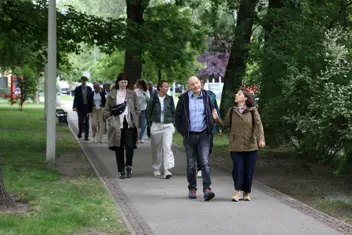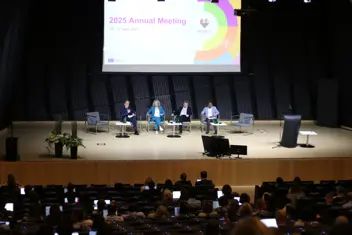The JA PreventNCD project is gaining momentum across Europe, with several concrete outputs already taking shape. The project annual meeting took place on June 16-17 in Katowice, Poland. While priorities are shifting in today’s complex landscape, the prevention of noncommunicable diseases remains a top priority. Tackling persistent health inequalities and addressing social and commercial determinants of health in a structural way were highlighted as urgent tasks. Partners also emphasised the need to institutionalise stakeholder, youth, and population engagement, alongside strengthening monitoring systems as a basis for prioritising action. Evaluation and sustainability work is advancing steadily, ensuring the long-term impact of this collaborative effort.
First day
The first day began with opening welcomes from Izabela Leszczyna the Minister of Health of the Republic of Poland, Tomasz Szczepański the Rector of the Medical University of Silesia and Senator Beata Małecka-Libera Chairperson of the Senate Health Committee. The opening session also included strong institutional backing from DG Sante, the World Health Organization, and local authorities. Their presence affirmed that prevention is no longer a secondary consideration but a top-tier priority in European public health policy.
Knut-Inge Klepp opened the next session by calling for a shift in how we approach NCDs—moving beyond individual responsibility to tackle the broader social and commercial drivers of ill health. Echoing this, Nason Maani, external advisory board member, challenged participants to confront the commercial determinants of health, including marketing, pricing, and political lobbying, urging structural change to reshape entire systems in favor of health.
Equity was a core theme for the next session. Raffaella Bucciardini presented our efforts to reduce health inequalities through integrated public health actions. Gerd Monika Flodgren shared findings from a European scoping review on policies addressing health disparities. Valentina Possenti and Nicole Rossi emphasised the role of population surveillance in driving equity-oriented action. Benedetta Armocida, scientific coordinator of the JACARDI Joint Action, introduced their inclusive approach to equity and diversity and emphasised the urgent need to reduce disparities in NCD outcomes. Sudhvir Singh from WHO provided a global perspective on addressing the social determinants of health equity, reinforcing the imperative of integrated responses at all levels.
Throughout the two days, participants engaged in a series of thematic parallel sessions. The sessions of the first day included:
- Bridging the gap: Health literacy for at-risk individuals
- Food environments and commercial determinants of diet – showcasing JA PreventNCD activities
- Alcohol prevention – showcasing JA PreventNCD activities
The day ended with a well-deserved wellbeing walk creating space to move, talk, and connect with colleagues while exploring Katowice, followed by a relaxed networking apéritif.

Second day
The morning began with a panel of leading experts, Knut-Inge Klepp, Harry Rutter, Kremlin Wickramasinghe, and Caroline Costongs who discussed how JA PreventNCD can influence policy change, align with wider European efforts, and demonstrate added value in preventing non-communicable diseases.
Attention then turned to the importance of building strong national capacities for monitoring and prevention. Speakers shared early insights from country-level data on NCDs, including efforts to track policies, healthcare access, and associated costs. This session highlighted the need for robust surveillance systems and data-driven decision-making.
The final session of the morning explored what it takes to ensure long-term success and impact. Presenters emphasised the role of evaluation, accountability, and sustainability in public health initiatives. They shared findings from collaboration surveys, discussed evaluation frameworks, and provided examples from pilot projects targeting vulnerable groups, offering practical lessons for achieving lasting change.

The afternoon featured two sets of parallel sessions, each offering diverse perspectives on prevention and engagement in the field of NCDs.
First set focused on community action and tobacco prevention, including:
- Tobacco prevention: FCTC at 20 – reflecting on progress, future goals, and industry influence
- A workshop on decision-makers’ commitment and local engagement for sustainable impact
- Power to the people: activating communities for a healthier future
The second set addressed systems, physical activity, and communication:
- A workshop on shaping the future of NCD information systems
- Strategies for promoting physical activity to boost prevention and wellbeing
- Strengthening JA PreventNCD’s communication and visibility
A significant milestone during the annual meeting was the first in-person meeting of the Youth Advisory Group. The group is diverse, enthusiastic and ready to contribute their insights and perspective. In wrap up of the meeting our External Expert Advisory Board encouraged the us to stay strong, look out for windows of opportunity, and work with key partners to maximize the impact of our efforts.

Looking Ahead
The Katowice meeting was powerful reminder that a meaningful change is possible when countries work together, speak with a united voice, and stay grounded in science, equity, and strategic ambition.
Thank you to our generous hosts in Katowice for a well-organised and inspiring event.
